Well let’s start with an obvious one shall we? It was good enough for Aleister Crowley: the copy he bought as a 22 year old student at Cambridge University started his whole ‘let’s have a stab at this magic thing…’ and look where that got him. Here, in all it’s glory, is The Book of Black Magic and of Pacts Including the Rites and Mysteries of Goetic Theurgy, Sorcery and Infernal Necromancy by Arthur Edward Waite. London: George Redway, 1898:
After reading this, Aleister thought he had found what he was looking for after a period of spiritual crisis and excitedly wrote a letter, presumably via the publisher, to Arthur. At 41 and a perhaps wiser and more experienced traveller along the way, Arthur dampened the young man’s enthusiasm and sent him off in search of Karl von Eckhartshausen’s The Cloud Upon the Sanctuary, a work of a more mystical bent (which was really more of Arthur’s bag to be honest). In it the young aspirant discovered the idea of a Hidden School teaching through ceremony and symbols, which in Aleister’s case led him to that little late Victorian Rosicrucian cheese and wine party: The Hermetic Order of the Golden Dawn in the Outer (which I’m sure we’ll meet again soon in upcoming posts).
Anyway, we digress. This is a fantastic book. It’s quite large (many occult works are surprisingly small) bound in black buckram ( a strong, grained cloth) over bevelled boards, with the titles stamped in silver to the upper board (you’d probably call it the front of the book, but I’m a book dealer and can’t help it…) and the spine. It’s packed with illustrations, some of which are printed on different coloured paper, and a somewhat dramatic frontispiece (picture at the beginning of a book):
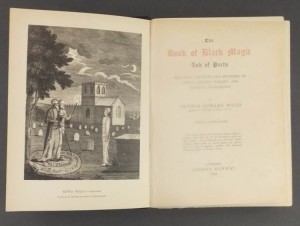
Auntie Flo in her nightie, looking understandably put out at two bearded men waving sticks and flaming torches at her.
It shows, in the words of Arthur himself: ‘Edward Kelley, the Alchemist and alleged Magician, in the act of invoking the Spirit of a Deceased Person’. Looking at this we can probably do without the ‘alleged’ bit…
The second part of the book reprints many extracts from various Grimoires: The Key and Lesser Key of Solomon, Grand Griomoire, Grimorium Verum, Method of Honorius and various greatest hits from Petit Albert, The Black Pullet etc.
The first part is where Arthur flexes his scholarly muscles, basically giving a bibliographical overview of Grimoires. This is great stuff and a useful tool for poor fools such as me, who try and pick their way cautiously through the minefield of Grimoire publishing history. There are many, many editions (lots of which are in French. It seems that vast amounts of the 18th and 19th Centuries’ paper production was gobbled up by mad Frenchman publishing random Grimoires, sometimes more than one a week or so it seems…)
The main thing to learn is: never trust the printed date in a Grimoire. Or the place it was supposed to have been printed. These are nearly always wrong. Oh, and they all copy each other.
This was the first time this approach had been generally published. The Key of Solomon the King had been translated and published by S. L. MacGregor Mathers in 1889 and featured a historical introduction. John Ferguson (he of Bibliotheca Chemica fame – or not if you haven’t heard of him of course) had been delivering papers to the Glasgow Archaeology Society on Books of Secrets since 1882, with many editions of Grimoires cropping up, but these were not collected and published until 1959. Francis Barrett’s The Magus had collected many sections of various ritual works and Grimoires, but that was nearly a century earlier in 1801, and contained little bibliographical information. So this, for all the drama, is an important work.
Arthur has often been vilified for his writing style, by our old friend Aleister among others, and it is hard to fight the accusation with such gems as:
‘In what perhaps might be permissible to term the mind of Magic, as distinct from the effects which are proposed by the Rituals, there has always been a clear contrast between the two branches corresponding to Magus and Sorcerer, and the fact that the ceremonial literature tends to the confusion of the distinction stamps it immediately garbled.’
Quite.
However, his research and incredible work rate cannot be doubted – his translations and editorship of many early alchemical works and his tour de force of Rosicrucian history, The Brotherhood of the Rosy Cross being highlights. Oh and he also got drunk on gin and wandered the streets of London with Arthur Machen. Which is more than good enough for me.

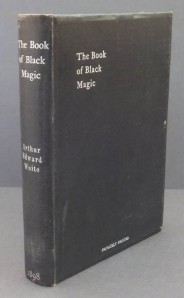
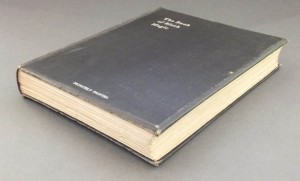
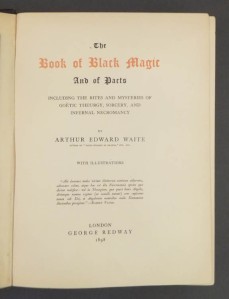
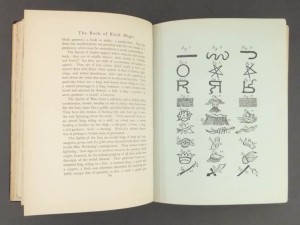
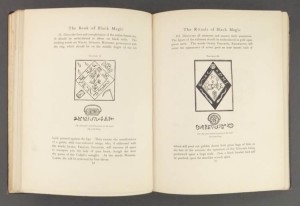
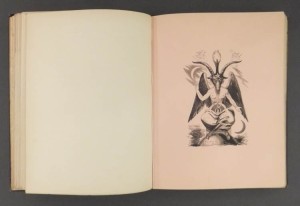
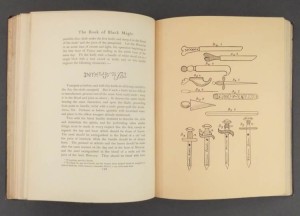
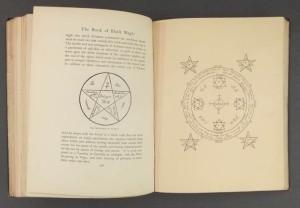
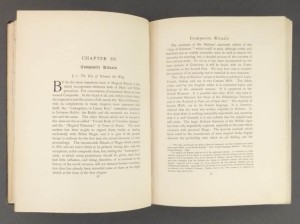
Pingback: Gasp! Black Magic… | Bibliodeviancy
Reblogged this on Bibliodeviancy and commented:
Mr. Cowl his own self holds forth:
As you mentioned, Waite is often criticized for his writing style and for occasionally mocking magic and, in particular, the evocation proper of spirits, but his research is impeccable and he, in fact, hides many occult truths within his many rants which appear to mock the very subject he’s writing about.
Absolutely; that’s a great point. He did after all translate many of Eliphas Levi’s works and revised and expanded this work in 1911, though it’s fair to say he did move towards mysticism in later life. The classic example of this ‘bait and switch’ has to be Heinrich Cornelius Agrippa, who after criticizing and distancing himself from magic in his De Incertitudine et Vanitate went on to publish one of the most influential magic books of all time soon after: De Occulta Philosophia Libri Tres.
Very interesting information. I know nothing about occult books and will be following with interest this blog.
Thank you – hopefully I can keep you interested!
Nice Blog, thanks for sharing this kind of information.
Thank you – though it’s been more than a year since I’ve added anything, I do intend to upload more content eventually…
Pingback: “There is only one thing…” | Magister's Bookshelf
thank dog! i am in love with your site. thank you for this archive ❤
~Arganthia
Thank you! Apologies for the lack of recent posts – I will add more eventually…